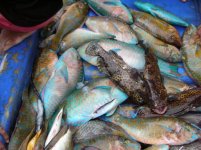cortez marine":3jvuxewt said:
By the way, Steve, I'm interested to know what you think of marine reserves and no take zones. When it comes to habitat, so many of the researchers I have interviewed advocate these, and they are such flash points for aquarium hobbyists and fisherman. I'd love to know your thoughts in this regard...
.
So long as the reserves are decided upon with local input and participation [ rare] and not shoved down their throats by city people half a world away, yes.
I know of parks that are hated by locals as an invention and plaything of the rich and an artifact of snobs who disdain local people and who have to pay uncle Toms to protect them.
I have witnessed first hand the falsification of data that claimed to include the locals which it most certainly did not.
What really ran up the red flag for me though was the shooting deaths of two unarmed fisherman inside Komodo National Park by park rangers a few years ago.
Who are the parks really for?
A cause? The funder recipients or the local people and their greater nation?
Its not the theory...but the implementation that is the key to making them really worthwhile. The love affair many egg heads ie. researchers have with theory as opposed to stategies for involving the locals more properly is the weakest link.
Steve
I agree that implementation is key, but the rub, of course, is that if cutting down the apparently plentiful rainforest in your backyard is what it takes to put food on the table for your children, any self-respecting family man is probably going to cut down the rainforest to feed his family regardless of what some researcher has to say abour deforestation, biodiversity, critical biomass, and global climate change (I specifically chose a non-marine example here, by the way).
Are the politicians justifiied when they step in and protect the land because they believe that, based on "the science," they need to protect the rainforest for the good of the entire earth, even if self-respecing local is going to struggle even more to feed his family? Should the local governments subsidize the local? Hook him up with a quasi-sustainable eco-tourism job? And, of course, what role should the local have played in the first place during the legisslative process, as they are clearly an (the?) expert on the rairnforest in which they live based on their first hand experience? Yet left to his own devices, he would continue to clear-fell it. These are difficult issues.
I have worked in in the Andes quite a bit looking at global climate change, and I have often felt the conflict first hand. Who am I, as an American and part of a fancy expedition, to tell locals that their use of cattle is not sustainable in the paramo? While it's clear to me that the erosion caused by the non-indiginous cow's hoof is stripping the paramo of its reservoir-like capability at the same time that the glaciers are experiencing unprecedented recession (another reservoir of water disappearing). Especially when I believe that my nation's carbon footprint is contributing to the rapid glacial recession, which will, in a very short time, alter the locals lifestyle and livliehood perhaps irrevokably? Who am I to tell them how to live their lives in the name of the betterment of the earth when the country I represent to said local is so responsible for so much degredation.
And yet I know that it is my country that can ultimately affect change here more quickly than any local agency or ministry (again, I know this first hand based on working with local governments that are dealing with immediate issues like stability, unemployment, drug wars, and internal coruption). There are wonderful people in country with whom I have worked, but they have to deal with the same system too...very complex indeed.
And so back to marine reserves, especially those intended to protect herbivorous fishes that may be critical to the health and revover of degraded reefs thet world over. How are the needs and concerns of all stakeholders balanced when creating a marine no-take zone intended to protect a functional group the science tells us is important. Might the science be wrong? Might it be rife with political agendas and funding entanglements? Sure. But aren't nearly every stakeholders statements and motivations flawed? We have an obligation to push hard against the science to make sure it is peer reviewed and considers a real-world perspective rather than just the inside of an ivory tower, but railing against all researchers is no better than saying damn the locals and imposing are choices on them.
Again, this is back to my central point--the point to which all my work eventually returns--we need to have the discussion and listen to all sides. That discussion, in my opinion needs to happen on remote beaches in developing nations, on Internet forums like this, in academic institutions, in living rooms before the fishtank, in legislative halls, and in a hundred other places. That's why I have been asking these questions, and that's why I am writing about herbivorous fishes right now. That's why I have listening to people like Bellwood and Mumby and Pauly. That's why've I've been in touch with collectors in hawaii, and local fisherman in the Caribbean and Central America. This is a journey, as every story I write is, and it's a journey without a known destination. I so appreciate your willingness, Steve, to part of the discussion. It is truly a great help. Bring it on!
...I need more coffee.






